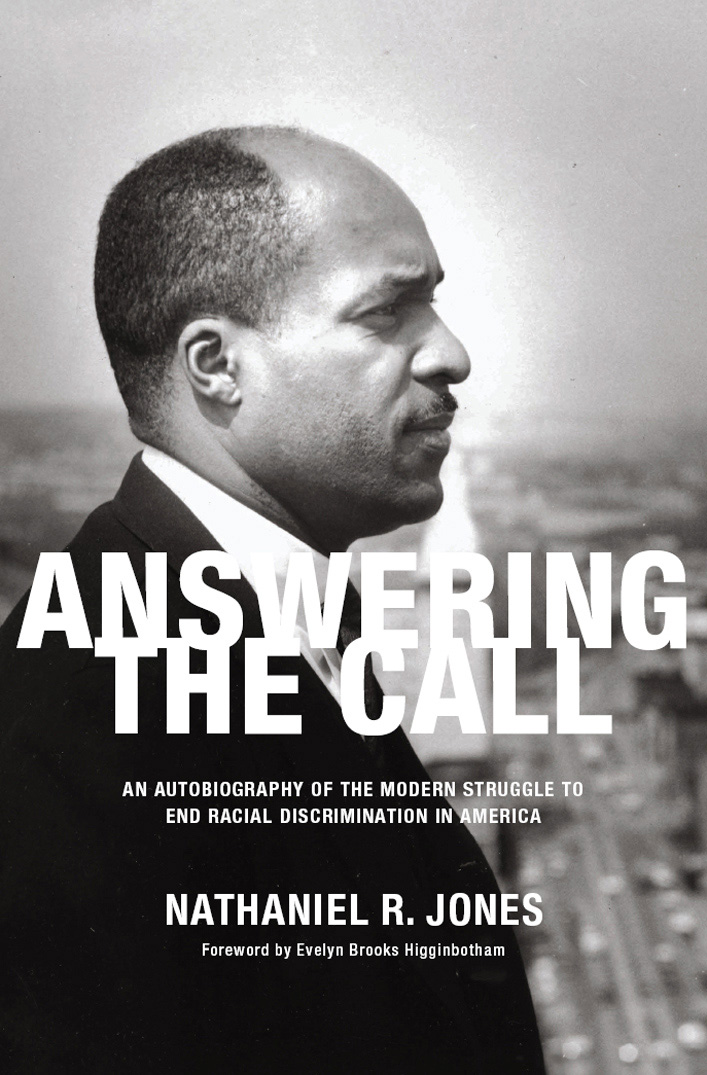
Answering the Call
An Autobiography of the Modern Struggle to End Racial Discrimination in America
فرمت کتاب
ebook
تاریخ انتشار
2010
نویسنده
Evelyn Brooks Higgenbothamناشر
The New Pressشابک
9781620970713
کتاب های مرتبط
- اطلاعات
- نقد و بررسی
- دیدگاه کاربران
نقد و بررسی

March 21, 2016
Jones, who retired from the U.S. Court of Appeals, Sixth Circuit, in 2002, offers a forthright and revealing memoir of serving as a judge and lawyer on the front lines of the civil rights era. In the 1960s, he served as deputy general counsel on the Kerner Commission, formed by President Johnson to study civil disorder, and argued for greater compassion for protesters condemned as “rioters.” In his role as NAACP general counsel, he coordinated the defense of school desegregation initiatives during the 1970s, and as a judge on the Court of Appeals, he insisted on hiring African-American law clerks. In a work rich in context and analysis, he covers a variety of topics, including Obama’s election and the myth of a post-racial America, serving in the segregated WWII-era military, the Scottsboro Boys, and the appointment of Clarence Thomas, whom he considers one of history’s “most colossal double-crossers.” He also writes that the champions of states’ rights have managed to “reinstate a variety of once-outlawed Jim Crow tactics” to disqualify minorities and suppress their votes. This careful, considered debut highlights a life committed to justice and to the principle that the law is the “inescapable route” to attaining equality.

March 15, 2016
Triumphs and frustrations mark the author's long legal career. In his candid, informative debut memoir, Jones, who in 2002 retired from the U.S. Court of Appeals, 6th Circuit, recounts his work as a lawyer and judge, including serving as general counsel for the NAACP. His nomination to the 6th Circuit by President Jimmy Carter, he writes, was "the pinnacle" of a career that began "at a time when the profession practiced its own form of racial apartheid." Jones was born in Youngstown, Ohio, in 1926, 17 years after the founding of the NAACP and the publication of The Call, a document "imploring Americans to discuss and protest the racial problem and to renew the struggle for civil and political rights." That document deeply influenced him, as did his mentor, J. Maynard Dickerson, who guided and often goaded him throughout their long relationship. After growing up in an integrated neighborhood, Jones learned a hard lesson in "deeply entrenched and pervasive" segregation when he joined the Army in 1945. Attending college on the GI Bill, he enrolled in a pre-law course, continued with law school at night, and became involved in civil rights issues, increasingly conscious of the ways that racism was built into voting, housing, health benefits, jobs, and education. His work for the NAACP focused on desegregation, notably in the North, where judges were not convinced that the Brown v. Board of Education decision applied, and on landmark affirmative action cases. Jones praises civil rights lawyers for tirelessly establishing legal standards and fighting federal efforts to thwart them, and he is edifying in his reasons for opposing Clarence Thomas for Supreme Court Justice. Although thrilled at Barack Obama's "amazing election," in the discourse surrounding it, Jones was reminded of the need to keep civil rights history alive for the media, Congress, and the judiciary. A forthright testimony by a witness to history.
COPYRIGHT(2016) Kirkus Reviews, ALL RIGHTS RESERVED.

Starred review from May 15, 2016
In his autobiography, Jones, a trailblazing African American judge, delivers an urgently needed perspective on American history by shining a light on such racial inequities as the 1896 Plessy v. Ferguson decision, which called for separate-but-equal treatment for blacks and whites yet in practice led to systematic discrimination against and segregation of African Americans in every phase of life. Jones moves on to track the changes brought about under the landmark leadership of Thurgood Marshall in his role as general counsel for the NAACP and with the passage of Brown v. Board of Education in 1954, which opened doors, most importantly in education, employment, and housing. Jones recounts his own experiences serving as NAACP general counsel and fighting for the school desegregation stipulated by Brown, and as a judge on the U.S. Court of Appeals, Sixth Circuit. But Jones did not write his story to cite his own accomplishments; instead, his mission is to call attention to the rolling back of earlier legal victories, including the 2013 gutting of the 1965 Voting Rights Act. He convincingly argues throughout this passionate and informative account that the rule and force of law achieved through Brown v. Board of Education must be upheld, or we face a return to the racial injustices of the past.(Reprinted with permission of Booklist, copyright 2016, American Library Association.)

























دیدگاه کاربران